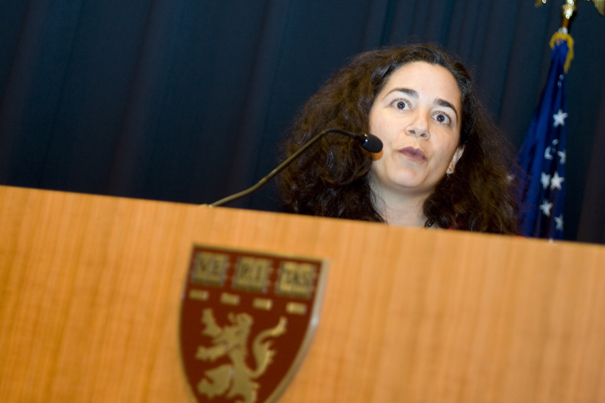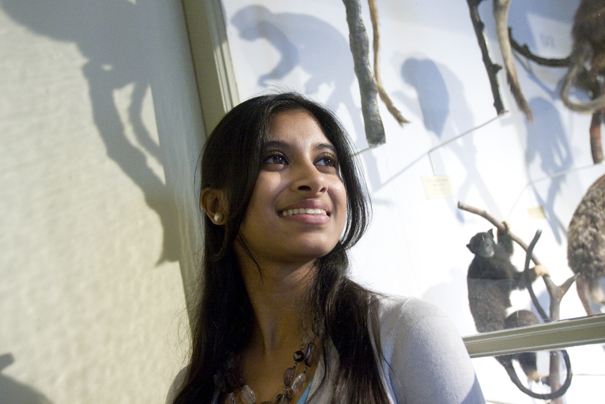Health
-

Yoga can help cut severe, initial opioid-withdrawal period in half, study finds
Researchers say results could dramatically increase chances of recovery
-

6 keys to a long, healthy life (ice cream included)
Also, why reading Ben Franklin beats climbing Mount Everest
-

Six cancers rising faster in younger adults than older ones
Large new global study fuels growing concern over trend of increases in several types

-

What’s next for GLP-1s?
Scientists eye new treatment targets for popular weight-loss drugs, from heart failure to addiction
-

Pricey blockbuster GLP-1s are costing users — and most of the rest of us, too
Health insurers are passing along cost for coverage in form of higher rates across the board, policy researcher says
-

Drinking 2-3 cups of coffee a day tied to lower dementia risk
Caffeinated tea also found to slow cognitive decline in study

-
Researchers discover chemical that kills cancer stem cells
A multi-institutional team of Boston-area researchers has discovered a chemical that works in mice to kill the rare but aggressive cells within breast cancers that have the ability to seed…
-
Kauffman Foundation awards researcher entrepreneurial fellowship
Praveen Kumar Vemula, a postdoctoral researcher in the Karp Lab at Brigham and Women’s Hospital, is one of 13 researchers to receive the Kauffman Foundation Entrepreneurial Postdoctoral Fellowship Award. Vemula…
-
Postdiagnosis aspirin use reduces risk of dying from colorectal cancer
Regular use of aspirin after colorectal cancer diagnosis may reduce the risk of cancer death, report Harvard researchers at Massachusetts General Hospital (MGH), Dana-Farber Cancer Institute (DFCI) and Brigham and Women’s Hospital. In today’s edition of the Journal of the American Medical Association, the study’s authors also find that the aspirin-associated survival advantage was seen primarily in patients with tumors expressing the COX-2 enzyme, a characteristic of two-thirds of colorectal cancers.
-
New steps forward in cell reprogramming
Harvard Stem Cell Institute (HSCI) researchers at Massachusetts General Hospital (MGH) have substantially improved the odds of successfully reprogramming differentiated cells into induced pluripotent stem cells (iPS) by blocking the…
-
Economy shaping health care reform effort
Political and philosophical differences aside, it’s the economic crisis that’s driving the current national health care reform debate. “Every day the president gets an envelope [that] says, ‘Whoa! Bigger [deficit]…
-
Freshwater fish at top of food chain evolve more slowly
Since evolving to eat other fish, freshwater fish at the top of the food chain have remained relatively unchanged compared with their insect- and snail-eating cousins, according to new research.…
-
Scientists create energy-burning brown fat in mice
Harvard researchers at Dana-Farber Cancer Institute have shown that they can engineer mouse and human cells to produce brown fat, a natural energy-burning type of fat that counteracts obesity. If…
-
Maternal, paternal genes’ tug-of-war may last well into childhood
An analysis of rare genetic disorders in which children lack some genes from one parent suggests that maternal and paternal genes engage in a subtle tug-of-war well into childhood, and…
-
MGH researchers develop potentially safer general anesthetic
News release — Mass. General team develops potentially safer general anesthetic A team of Harvard Medical School (HMS) researchers at Massachusetts General Hospital (MGH) has developed a new general anesthetic…
-
Earlier AIDS drug treatment would save 76,000 lives over 5 years
EMBARGO DATE CORRECTION — JULY not August — Study suggests earlier HIV antiviral treatment saves lives and is cost effective, even in areas of limited resources Early initiation of lifesaving…
-
Lifestyle culprit in increase in cardiovascular disease
Despite the perception that cardiovascular disease is a problem of industrialized countries, it is the leading cause of death everywhere except Africa, where it is eclipsed by the raging AIDS…
-
Interfaculty Initiative in Health Policy awards Cordeiro Health Policy Summer Research Grants
Thee Interfaculty Initiative in Health Policy at Harvard has announced the 2009 recipients of the Cordeiro Health Policy Summer Research Grants.
-
An unusual collection: A brain tumor tissue bank
Five years ago, as she was walking into Caritas Holy Family Hospital and Medical Center in Methuen, Mass., Patricia Fay saw a priest she knew and cornered him. “I’m like…
-
Damon Runyon Cancer Research Foundation awards fellowships to Harvard scientists
The Damon Runyon Cancer Research Foundation, a nonprofit organization focused on supporting exceptional early career researchers and innovative cancer research, has selected four Harvard affiliates to receive Damon Runyon fellowships at its May 2009 Fellowship Award Committee review.
-
Steffie Woolhandler, MD, MPH, receives excellence in mentoring award from Harvard Medical School
Steffie Woolhandler, MD, MPH, a staff physician and Associate Professor of Medicine at Harvard Medical School (HMS), is a recipient of the 2008-2009 A. Clifford Barger Excellence in Mentoring Award.…
-
First molecular steps to childhood leukemia identified
A Harvard research based at Massachusetts General Hospital has identified how a chromosomal abnormality known to be associated with acute lymphoblastic leukemia (ALL) – the most common cancer in children…
-
Glimpsing the birth of our earliest reproductive cells
It has long been a mystery how the developing embryo designates those rare, precious cells destined to produce sperm and eggs — enabling us to have offspring – since these…
-
Jeremiah Mead, architect of respiratory mechanics field, dies
Jeremiah “Jere” Mead, architect of the field of respiratory mechanics and professor emeritus in the Department of Environmental Health at the Harvard School of Public Health (HSPH), passed away on…
-
When physicians share notes with their patients
Patients across the country are voicing a growing desire for greater engagement in, and control over, their own medical care. A new study led by Beth Israel Deaconess Medical Center…
-
Human cardiac master stem cells identified
Harvard Stem Cell Institute researchers at Massachusetts General Hospital have identified the earliest master human heart stem cell from human embryonic stem cells – ISL1+ progenitors – that give rise…
-
Spinal fusion protein associated with complications, higher costs
In the United States, back pain continues to be a leading cause of disability and one of the most common reasons to see a physician for evaluation. Among various treatment…
-
Low blood sugar in hospital linked to higher death risk
Harvard researchers at Brigham and Women’s Hospital (BWH) found that diabetics hospitalized for noncritical illnesses who develop hypoglycemia (low blood sugar) during hospitalization have an increased likelihood of remaining hospitalized…
-
AIDS research symposium details advances
Harvard AIDS researchers detailed recent advances in the fight against the ongoing global pandemic, including new vaccine strategies, insights into the disease’s progression in the world’s hardest-hit regions, and new knowledge about the body’s immune response against infection.

-
Safer stem cells for therapy
When stem cell researchers in Japan and the United States announced in 2007 that they had developed long-sought methods to return fully developed adult human cells to an embryonic-like state, the world of stem cell research was turned upside down.
-
Study pinpoints novel cancer gene and biomarker
Dana-Farber Cancer Institute scientists’ discovery of a cancer-causing gene – the first in its family to be linked to cancer – demonstrates how the panoramic view of genomics and the…
-
A urine test for appendicitis?
Harvard researchers at Children’s Hospital Boston have identified a protein in the urine of appendicitis patients that they believe may provide the basis of a quick, noninvasive, accurate, and inexpensive test for the common condition.
-
Common ECG finding may indicate serious cardiac problems
A common electrocardiogram (ECG) finding that has largely been considered insignificant may actually signal an increased risk of atrial fibrillation (a chronic heart rhythm disturbance), the future need for a…
-
D. Mark Hegsted, national force in science of human nutrition, dies
D. Mark Hegsted, who was instrumental in the development of the federal “Dietary Guidelines for Americans,” died Tuesday, June 16, 2009, at the age of 95 at a nursing center…
-
Computer scientists model cell division
Computer scientists at Harvard have developed a framework for studying the arrangement of tissue networks created by cell division across a diverse set of organisms, including fruit flies, tadpoles, and…
-
Individual primates display variation in general intelligence
Scientists at Harvard University have shown, for the first time, that intelligence varies among individual monkeys within a species – in this case, the cotton-top tamarin.


